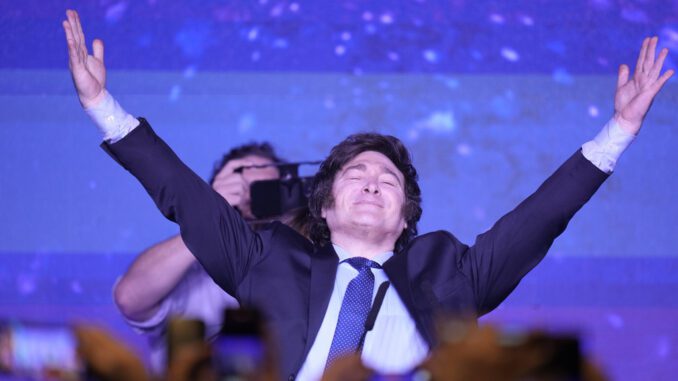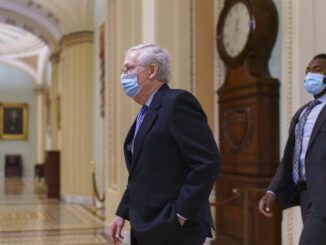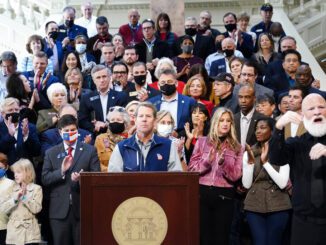
The media would like you to know that Javier Milei, the upstart candidate who improbably won Argentina’s presidential primary this week, is a “Trump admirer,” “right-wing populist,” “far-right outsider,” “far-right populist,” “rightist,” “far-right libertarian,” a “radical” — and did they mention he’s on the “far right”?
Anyway, I’m no expert on Argentinian politics, so this coverage sparked my curiosity. And it turns out, Milei — also known as el Peluca (“The Wig”) because he sports the hairstyle of a man spinning jazz-flute fusion records in his velvet-draped bachelor pad circa 1972 — is far more interesting than headlines would have us believe.
An economist and rhetorical pugilist, Milei’s philosophical outlook could more precisely be described as “doctrinaire ultraliberal,” (the good kind) as Andres Malamud of the Institute of Social Sciences of the University of Lisbon recently put it. That is news because it is an exceptionally rare outlook.
Milei threatens to upend the political order in a country in the middle of another economic meltdown. Once-low poverty rates have exploded — some estimates put it at 43% — while the currency continues to lose its value. Milei, a longtime television personality, has made the case that Argentines are “hostages” to generationally destructive economic policy. (Interest rates were hiked to 118% this week.) He argues that politicians — or, as he calls them, “rats” of the “parasitic, useless and useless political caste” — have destroyed one of the richest countries in the world “with nefarious ideas to line their pockets.”
Many of those ideas, Milei argues, can be found in Keynesian economics, which lies at the heart of most of Western society’s ills. The candidate promises to shut down the central bank, dollarize the economy, deregulate markets, open up trade, cut taxes and pare the regulatory regime. Not incidentally, his English mastiffs are named after Milton Friedman, Murray Rothbard and Robert Lucas. (Question: “Is economics an exact science?” Answer: “No, because if it were, socialism would work.”)
When Milei was asked if happiness was more important than liberty, he responded, “They go hand in hand. You cannot be happy without being free.” I’m skeptical that’s the case for everyone. But Milei’s placing of personal liberty as the prerequisite for not only a prosperous society but a virtuous one is welcome in a world where politicians increasingly look to bureaucracies, the welfare state and “industrial policy” to save us.
In the United States, big-government conservatives like to complain that “libertarians” like Milei aren’t equipped, or are unwilling, to take on social issues. Yet the candidate not only does so, he frames his defense as both a moral and liberal imperative. “I am openly against abortion,” Milei says. “As a liberal I believe in unrestricted respect for others. You can choose over your body, but not over the body of the other.” When asked why he wants to shut down government “sex education” programs, Milei referred to them as “a mechanism” of propaganda that destroys the family and “comes down from the state with the intention of promoting everything that the line of the left and gender ideology has.”
While Milei has a Trumpian disdain for “elites” and engenders loyalty from his fans, the Argentine does not share the former president’s adoration for state power and believes (rightly) that free markets offer a massive positive upside for the working and middle class.
Milei has promised to raffle off his presidential paycheck, and 2.4 million Argentines have already registered to win $3,200 every month. “To me, that is dirty money,” he explained. “From my philosophical point of view, the state is a criminal organization that is funded through taxes taken from people by force. We are giving back the money that the political caste has stolen.” And along with rejecting climate alarmism as a destructive attack on modernity, he proposes an armed citizenry and calls for Argentina to move its embassy from Tel Aviv to Jerusalem. (Both the United States and Israel, he says, are his “natural allies.”)
Into my veins, as the kids say.
And what might seem surprising is that Milei’s popularity is driven by younger voters. It is, of course, likely that part of that support is a protest vote against the failures of the Argentinian establishment rather than any ideological statement. Most ordinary people aren’t “doctrinaire” about anything. Still, it shows that individual liberty — mocked as antiquated and puerile rhetoric by both right and left these days — can still have some currency.
All this radical liberalism talk has prompted President Alberto Fernandez to warn that Milei is “a threat to democracy” and invoke Adolf Hitler and totalitarianism, as one always does. As far as I can tell, with authoritarian ideas gaining ground at an alarming rate, we could use more charismatic populist liberals like Milei.
David Harsanyi is a senior editor at The Federalist.



